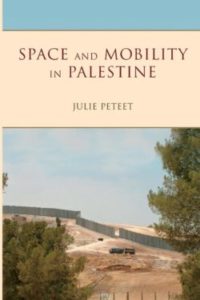Space and Mobility in Palestine
Reviewed by  Middle East Research and Information Project, 21/10/2019, Bloomington, Indiana University Press, 2017, 252 pages), under he title “Occupying Palestinian space”.
Middle East Research and Information Project, 21/10/2019, Bloomington, Indiana University Press, 2017, 252 pages), under he title “Occupying Palestinian space”.
“Space and Mobility in Palestine by Julie Peteet is a rare ethnography that offers an in-depth critical analysis of the spatio-political processes currently taking place in Palestine. This book is valuable for scholars and students from a wide range of disciplines who are interested in the Israeli-Palestinian conflict, in Palestine studies and in understanding how spatio-political processes govern everyday life.”
“The book opens with Peteet’s encounter with Ahmad, a Palestinian from the village of Bil’in, whose life story encapsulates the history and contemporary reality of colonized Palestine. Ahmad’s restricted mobility in the territory of Israel\Palestine, the history of his family as subjects of a colonial project, the unclear future of his land and his exposure to routine violence, all movingly illustrate Peteet’s main theoretical contribution to the contemporary study of Palestine: showing how the violent territorial expansion of Israeli settler-colonialism has developed mobility regimes that govern and restrict Palestinian movement through space.”
“Space and Mobility in Palestine shares many concerns found in other important books about Israel’s occupation and the colonial project in the West Bank. These include Neve Gordon’s seminal book Israel’s Occupation (2008), which offers a Foucauldian political, historical and economic analysis of Israel’s occupation; Normalizing Occupation (2017), edited by Marco Allegra, Ariel Handel and Erez Maggor, which provides a framework for understanding the process of “normalization” of colonization in the West Bank, highlighting the transformation of the landscape, the patterns of relationships shared by the region’s residents and the lasting effects of Israel’s settlement policy; and The ABC of the OPT (2018), edited by Orna Ben-Naftali, Michael Sfrad and Hedi Viterbo, a lexicon of Israeli control over the Occupied Palestinian Territories, which describes the ways in which international and domestic laws are implicated in the multitude of measures taken by the Israeli regime to establish and maintain its control over the Occupied Palestinian Territories.”
“Peteet’s book, however, takes a different methodological and theoretical path. Rather than focusing on Israel’s legal, policy or military apparatuses of occupation, she analyses the effect of Israel’s colonization on Palestinians. She offers a micro-study of Palestinian mobility and everyday life as a “site of particular configurations of power, identities and meaning in a modern settler-colonial context” …
“Peteet’s historical and political analysis, importantly, links the settler colonial project of the1948 war and the establishment of the state of Israel, to the spatial turning point of June 1967, when Israel occupied the West Bank and East Jerusalem. As she does with Israel’s initial settler-colonial processes, Peteet examines two complementary strategies implemented by Israel to relocate borders and boundaries, shift populations and reshape the occupied territories: the construction of a massive outer ring of Jewish neighborhoods in East Jerusalem, and the establishment of Jewish settlements in the West Bank. Both are referred to as colonies by Peteet—colonies that currently house over 700,000 people and serve to constrict all Palestinian development. Other Israeli policies, such as house demolitions, the prevention of immigration and control over land further restrict Palestinian development.” (more…)
